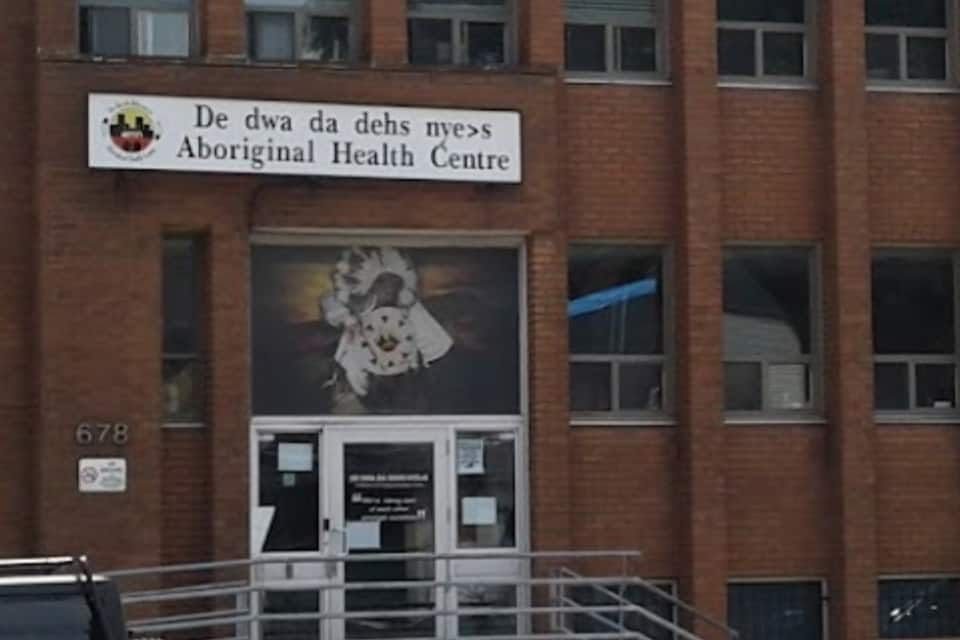Indigenous-led health and well-being centre in Hamilton receiving $10M from province
Published April 27, 2022 at 7:29 pm

The De dwa da dehs nye>s Aboriginal Health Centre has gained a foundation to better serve the Indigenous population of the Hamilton area.
On Wednesday, DAHC announced that it has received $10 million in funding from the Ontario Ministry of Health, which will help with its redevelopment and renaming. The long-term goal is to create an Indigenous-led well-being centre in Hamilton’s McQuesten neighbourhood, where health, family, social and housing services and supports can be better threaded.
The new community centre will operate under the name Biindigen Well-Being Centre. The provincial funding will go toward he foundation for Biindigen.
De dwa da dehs nye>s is the only urban Indigenous health care provider in the greater Hamilton area that provides a blend of western and Indigenous Traditional Medicine. It has served the residents since 1998. But DAHC’s facility at 678 Main St. E. is neither large nor modern enough to serve an Indigenous community of almost 18,000 people, along with patients and clients from the Brantford-Brant and Niagara areas.
“The provincial government’s investment of over $10M for De dwa da dehs nye>s capital redevelopment will enable us to address the health access barriers identified in a survey of the Indigenous community in Hamilton, including waiting lists and lack of trust in health-care providers,” DAHC Chair Bryanne Smart said in a statement.
In that survey, 48 per cent respondents said waiting lists were a barrier to health access, DAHC said. And 24 per cent cited a lack of trust in health-care providers. Along with wait lists for primary care, DAHC also has wait lists for health promotions programs in Hamilton and Brantford.
“As a member of the Indigenous Health Practitioners Task Force I am happy to celebrate with De dwa da dehs nye>s the infusion of resources to support the health and well-being of Indigenous people in Hamilton,” Dr. Amy Montour, an Onedia from Six Nations who is an adjunct clinical professor in the McMaster University medical school’s department of family medicine, said in DHAC’s release.
“These types of collaborative efforts by Indigenous organizations and governments demonstrate that we can move forward together to address inequities in the system and improve the experience of Indigenous people accessing health services.”
It is with great pleasure that De dwa da dehs nye>s is able to announce the provincial government investment of $10M for the redevelopment of the Aboriginal Health Centre in Hamilton, Ontario.
*Repost* pic.twitter.com/nz9NjVu7EC— De dwa da dehs nye's (@_DAHC_) April 27, 2022
Close to 1 million Indigenous people live in urban areas of Canada, which is higher than the population who live on First Nations. A Public Health Agency of Canada report in 2020 noted that the poverty rate among the urban Indigenous population is nearly double that of the rest of the urban population (24 per cent to 13). The poverty rate jumped to 30 per cent for Indigenous children and youth under age 18. Poverty is also a contributing factor to health outcomes.
Chiefs call on party leaders for ‘a voice with the government’
Improving health supports and community-based services were among the priorities for Indigenous communities that the Chiefs of Ontario shared with three of the four major provincial party leaders during a virtual meeting on Wednesday.
Before the meeting, Ontario Regional Chief Glen Hare and the Chiefs of Ontario urged the next government in a statement to recognize First Nations’ treaty-protected rights. Hare also asked that the party leaders have a First Nations person in their cabinet if they form government after the June 2 election.
“We need a voice with the government,” he said.
Ontario NDP Leader Andrea Horwath, who represents the Hamilton Centre riding, said her party is planning to ensure there are culturally appropriate services available for people and professionals trained to work in First Nations communities. Caldwell First Nation Chief Mary Duckworth noted that more direct access to health money might help find better solutions.
“I think the funds would do us better to create exactly what you’re trying to create, and we could do it within our territories and with their other First Nation partners,” Duckworth said.
Ontario Liberal Party Leader Steven Del Duca was asked about his position on economic reconciliation.
He said he hopes to change things from how they were done during his time as a minister in former Premier Kathleen Wynne’s government. At that time, he said the economic benefits for communities, in particular First Nations, were not often considered when planning infrastructure projects.
The former Liberal transportation minister also said he’s open to discussing exemptions for First Nations people from tolls on Highway 407.
Green Leader Mike Schreiner said he would support separating the cabinet portfolios of Indigenous Affairs and Northern Development, after it was raised that the two ministries “are in conflict with each other.”
While the funding for DAHC and capital development for the future Biindigen Well-Being Centre is from the province, Premier Doug Ford did not attend the meeting. The leader of the Ontario PC Party government, which is trying to win a second term, missed the meeting due to an unplanned dental procedure, his office said.
Last week, on April 21, Ford did not attend at a Black Community Provincial Leaders Town Hall. The week before that, on April 12, he did not attend a party leaders’ debate on women’s economic equality that was organized by the Equal Pay Coalition.
Del Duca, Horwath and Schreiner all attended both of those events.
— with files from The Canadian Press
insauga's Editorial Standards and Policies advertising





